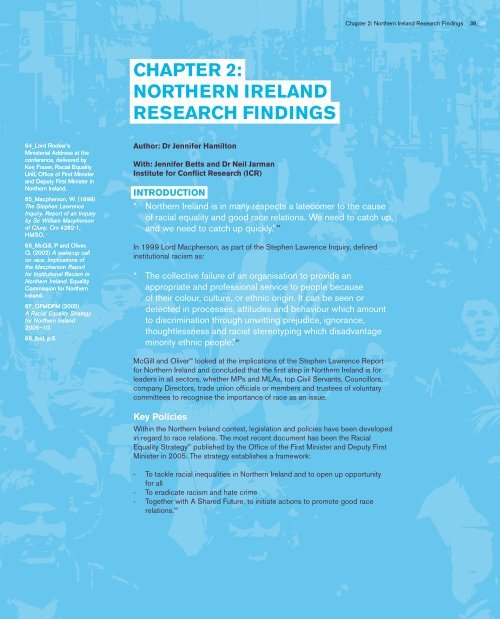improving government service delivery to minority ethnic ... - NCCRI
improving government service delivery to minority ethnic ... - NCCRI
improving government service delivery to minority ethnic ... - NCCRI
You also want an ePaper? Increase the reach of your titles
YUMPU automatically turns print PDFs into web optimized ePapers that Google loves.
Chapter 2: Northern Ireland Research Findings 38_39<br />
Chapter 2:<br />
Northern Ireland<br />
Research Findings<br />
64_Lord Rooker’s<br />
Ministerial Address at the<br />
conference, delivered by<br />
Ken Fraser, Racial Equality<br />
Unit, Office of First Minister<br />
and Deputy First Minister in<br />
Northern Ireland.<br />
65_Macpherson, W. (1999)<br />
The Stephen Lawrence<br />
Inquiry. Report of an Inquiry<br />
by Sir William Macpherson<br />
of Cluny. Cm 4262-1,<br />
HMSO.<br />
66_McGill, P and Oliver,<br />
Q. (2002) A wake-up call<br />
on race. Implications of<br />
the Macpherson Report<br />
for Institutional Racism in<br />
Northern Ireland. Equality<br />
Commission for Northern<br />
Ireland.<br />
67_OFMDFM (2005)<br />
A Racial Equality Strategy<br />
for Northern Ireland<br />
2005–10.<br />
68_Ibid, p.5.<br />
Author: Dr Jennifer Hamil<strong>to</strong>n<br />
With: Jennifer Betts and Dr Neil Jarman<br />
Institute for Conflict Research (ICR)<br />
Introduction<br />
“ Northern Ireland is in many respects a latecomer <strong>to</strong> the cause<br />
of racial equality and good race relations. We need <strong>to</strong> catch up,<br />
and we need <strong>to</strong> catch up quickly.” 64<br />
In 1999 Lord Macpherson, as part of the Stephen Lawrence Inquiry, defined<br />
institutional racism as:<br />
“ The collective failure of an organisation <strong>to</strong> provide an<br />
appropriate and professional <strong>service</strong> <strong>to</strong> people because<br />
of their colour, culture, or <strong>ethnic</strong> origin. It can be seen or<br />
detected in processes, attitudes and behaviour which amount<br />
<strong>to</strong> discrimination through unwitting prejudice, ignorance,<br />
thoughtlessness and racist stereotyping which disadvantage<br />
<strong>minority</strong> <strong>ethnic</strong> people.” 65<br />
McGill and Oliver 66 looked at the implications of the Stephen Lawrence Report<br />
for Northern Ireland and concluded that the first step in Northern Ireland is for<br />
leaders in all sec<strong>to</strong>rs, whether MPs and MLAs, <strong>to</strong>p Civil Servants, Councillors,<br />
company Direc<strong>to</strong>rs, trade union officials or members and trustees of voluntary<br />
committees <strong>to</strong> recognise the importance of race as an issue.<br />
Key Policies<br />
Within the Northern Ireland context, legislation and policies have been developed<br />
in regard <strong>to</strong> race relations. The most recent document has been the Racial<br />
Equality Strategy 67 published by the Office of the First Minister and Deputy First<br />
Minister in 2005. The strategy establishes a framework:<br />
-<br />
-<br />
-<br />
To tackle racial inequalities in Northern Ireland and <strong>to</strong> open up opportunity<br />
for all<br />
To eradicate racism and hate crime<br />
Together with A Shared Future, <strong>to</strong> initiate actions <strong>to</strong> promote good race<br />
relations. 68
















